JSP : Creating Custom Tag
- 1. CUSTOM TAG LIBRARY Prof. AshishSingh Bhatia 1Prof. AshishSingh Bhatia
- 2. Two Approach ’é¦ Java Based Custom Tag ’é¦ No Version Restriction ’é¦ Uses Java file for Tag Handling ’é¦ Preferred when lot of java code is required for getting output ’é¦ JSP Based Custom Tag ’é¦ Only from JSP 2.0 ’é¦ Uses JSP file for Tag Handling ’é¦ Preferred when lot of html code is required for getting output. Prof. AshishSingh Bhatia 2
- 3. Tag Library Components ’é¦ Tag handler class that defines the tag behavior. ’é¦ The TLD file that maps the XML element names to the tag implementation. ’é¦ The JSP file that uses the tag library. 3Prof. AshishSingh Bhatia
- 4. The Tag Handler Class ’é¦ Class that tells what to do when system see the tag. ’é¦ Class must implement SimpleTag interface. ’é¦ In practice, extends SimpleTagSupport which implements SimpleTag. ’é¦ javax.servlet.jsp.tagext package. ’é¦ Every Tag Handler class must have 0 argument constructor. ’é¦ doTag() is the main method for tag handling. ’é¦ We need JspWriter [ getJspContext().getOut() ] ’é¦ New instance is created for every tag occurrence on the page. Prof. AshishSingh Bhatia 4
- 5. Directory Structure hellowordtag index.jsp WEB-INF tlds tag.tld classes mytag HelloWorldTag.java Prof. AshishSingh Bhatia 5
- 6. Tag Handler Class package mytag; import javax.servlet.jsp.*; import javax.servlet.jsp.tagext.*; import java.io.*; public class HelloWorldTag extends SimpleTagSupport { public void doTag() throws JspException, IOException { JspWriter out = getJspContext().getOut(); out.print("<b>Hello World</b>"); } } Prof. AshishSingh Bhatia 6
- 7. TLD : Tag Library Descriptor <?xml version="1.0" ?> <taglib version="2.0"> <tlib-version>1.0</tlib-version> <short-name>mytag</short-name> <tag> <description>HelloWorld Tag</description> <name>helloworld</name> <tag-class>mytag.HelloWorldTag</tag-class> <body-content>empty</body-content> </tag> </taglib> Prof. AshishSingh Bhatia 7 Optional Required Element empty, scriptless, tagdependent, JSP
- 8. JSP File <html> <head> <title>Tag Example</title> </head> <body> <%@ taglib uri="/WEB-INF/tlds/tag.tld" prefix="ashish" %> <ashish:helloworld/> </body> </html> Prof. AshishSingh Bhatia 8
- 9. Assigning Attributes to Tags ’é¦ For every attribute we need a set method in tag handler class ’é¦ <prefix:tag attribute1=ŌĆ£value1ŌĆØ attribute2=ŌĆ£value2ŌĆØ ŌĆ” /> Prof. AshishSingh Bhatia 9 setAttribute1(String value) setAttribute2(String value)
- 10. TLD File <attribute> <description>ŌĆ”. </description> <name> X </name> <required> true/false </required> </attribute> Prof. AshishSingh Bhatia 10 X = Must match with the variable in class
- 11. Example : Custom tag to reverse a String public class StringReverseTag extends SimpleTagSupport { private String data; public void setData(String data) { this.data=data; } public void doTag() throws JspException, IOException { JspWriter out = getJspContext().getOut(); StringBuffer sb = new StringBuffer(data); sb.reverse(); out.print(sb); } } Prof. AshishSingh Bhatia 11
- 13. JSP FILE <html> <head> <title>Tag Example</title> </head> <body> <%@ taglib uri="/WEB-INF/tlds/tag.tld" prefix="ashish" %> <ashish:string data="EARTH"/> </body> </html> Prof. AshishSingh Bhatia 13
- 14. Including Tag body in Tag Output ’é¦ getJspBody().invoke(null) ’é¦ null means the resulting output of that JSP content is passed verbatim to the client. ’é¦ doTag() has no way to access the tag body output. ’é¦ Example In JSP File : <ashish:tag> This is the test </ashish:tag> In Java File out.print(ŌĆ£<b>Hello World</b> <br/>ŌĆØ); getJSPBody().invoke(null); out.print(ŌĆ£<b>This is my tag</b>ŌĆØ); In Tag File : <body-content>scriptless</body-content> Prof. AshishSingh Bhatia 14
- 15. Using Tag Files ’é¦ Java Based Custom Tag ’é¦ What we have seen is Java Based Custom Tag ’é¦ Tag handler class is Java File ’é¦ JSP Based Custom Tag [ Tag Files ] ’é¦ Tag Handler class is JSP file ’é¦ When to use which ? ’é¦ Simple Rule : Use Java Based Custom Tag when lot of java code is involved. IF more is of formatting use JSP Based Custom Tag. ’é¦ Remember Tag files run only on JSP 2.0. ’é¦ Java Base Tag have no such restriction. Prof. AshishSingh Bhatia 15
- 16. JSP Based Custom Tag ’é¦ Create a JSP Base tag file ’é¦ Create a JSP page that uses the tag file Prof. AshishSingh Bhatia 16
- 17. Structure tagdemo index.jsp WEB-INF tags helloworld.tag Prof. AshishSingh Bhatia 17
- 18. helloworld.tag and index.jsp Tag File [ helloworld.tag ] <b>Hello World</b> JSP File <html> <head><title>Tag Example</title></head> <body> <%@ taglib tagdir="/WEB-INF/tags" prefix="ashish" %> <ashish:helloworld/> </body> </html> Prof. AshishSingh Bhatia 18
- 19. String Reverse [ Using Attribute and Tag File ] ’é¦ Tag File [ reverse.tag ] <%@ attribute name="data" required="true" %> <% StringBuffer sb = new StringBuffer(data); sb.reverse(); %> <%= sb %> ’é¦ JSP File <%@ taglib tagdir="/WEB-INF/tags" prefix="ashish" %> <ashish:reverse data="EARTH"/> Prof. AshishSingh Bhatia 19
- 20. Using Body part of the tag using Tag File ’é¦ Use <jsp:Body/> to get the out put of body ’é¦ Example In JSP File : <ashish:test> This is the test </ashish:test> In Tag File [ test.tag ] : <b>Hello World</b> <br/> <jsp:doBody/> <b>This is my tag</b> Prof. AshishSingh Bhatia 20
- 21. END OF SESSION 21Prof. AshishSingh Bhatia


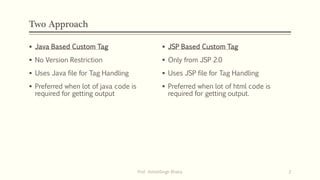
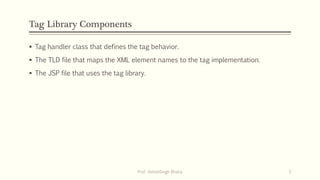
![The Tag Handler Class
’é¦ Class that tells what to do when system see the tag.
’é¦ Class must implement SimpleTag interface.
’é¦ In practice, extends SimpleTagSupport which implements SimpleTag.
’é¦ javax.servlet.jsp.tagext package.
’é¦ Every Tag Handler class must have 0 argument constructor.
’é¦ doTag() is the main method for tag handling.
’é¦ We need JspWriter [ getJspContext().getOut() ]
’é¦ New instance is created for every tag occurrence on the page.
Prof. AshishSingh Bhatia 4](https://image.slidesharecdn.com/customtaglibrary-130415115502-phpapp02/85/JSP-Creating-Custom-Tag-4-320.jpg)
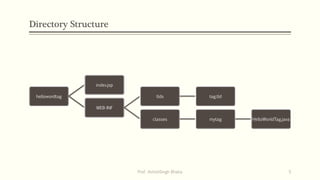
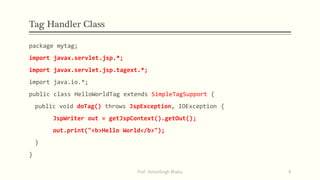

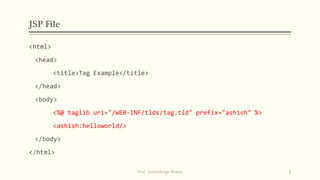




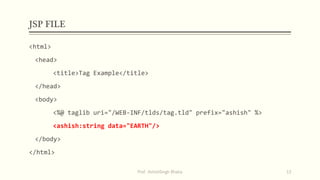
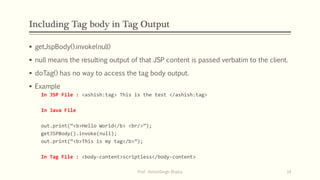
![Using Tag Files
’é¦ Java Based Custom Tag
’é¦ What we have seen is Java Based Custom Tag
’é¦ Tag handler class is Java File
’é¦ JSP Based Custom Tag [ Tag Files ]
’é¦ Tag Handler class is JSP file
’é¦ When to use which ?
’é¦ Simple Rule : Use Java Based Custom Tag when lot of java code is involved. IF more
is of formatting use JSP Based Custom Tag.
’é¦ Remember Tag files run only on JSP 2.0.
’é¦ Java Base Tag have no such restriction.
Prof. AshishSingh Bhatia 15](https://image.slidesharecdn.com/customtaglibrary-130415115502-phpapp02/85/JSP-Creating-Custom-Tag-15-320.jpg)
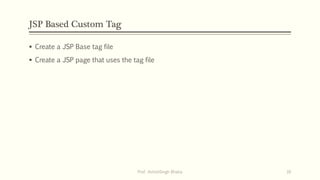
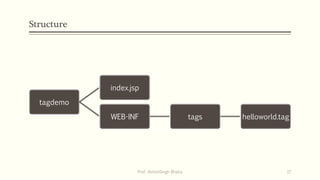
![helloworld.tag and index.jsp
Tag File [ helloworld.tag ]
<b>Hello World</b>
JSP File
<html>
<head><title>Tag Example</title></head>
<body>
<%@ taglib tagdir="/WEB-INF/tags" prefix="ashish" %>
<ashish:helloworld/>
</body>
</html>
Prof. AshishSingh Bhatia 18](https://image.slidesharecdn.com/customtaglibrary-130415115502-phpapp02/85/JSP-Creating-Custom-Tag-18-320.jpg)
![String Reverse [ Using Attribute and Tag File ]
’é¦ Tag File [ reverse.tag ]
<%@ attribute name="data" required="true" %>
<%
StringBuffer sb = new StringBuffer(data);
sb.reverse();
%>
<%= sb %>
’é¦ JSP File
<%@ taglib tagdir="/WEB-INF/tags" prefix="ashish" %>
<ashish:reverse data="EARTH"/>
Prof. AshishSingh Bhatia 19](https://image.slidesharecdn.com/customtaglibrary-130415115502-phpapp02/85/JSP-Creating-Custom-Tag-19-320.jpg)
![Using Body part of the tag using Tag File
’é¦ Use <jsp:Body/> to get the out put of body
’é¦ Example
In JSP File : <ashish:test> This is the test </ashish:test>
In Tag File [ test.tag ] :
<b>Hello World</b> <br/>
<jsp:doBody/>
<b>This is my tag</b>
Prof. AshishSingh Bhatia 20](https://image.slidesharecdn.com/customtaglibrary-130415115502-phpapp02/85/JSP-Creating-Custom-Tag-20-320.jpg)
